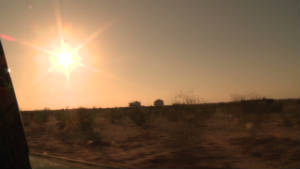November 3, 2011 -- Updated 1622 GMT (0022 HKT)

Ending organ trafficking
STORY HIGHLIGHTS
- Bedouin smugglers may be stealing organs from African refugees in Sinai desert
- Bedouin tribes accused of enslaving, torturing refugees who can't pay extortion money
- Activist says organs are taken from refugees while they're still alive
- Corneas, livers and kidneys are reportedly among the most sought-after organs
CNN's Freedom Project
special "Death in the Desert" airs on Saturday, November 5 at 2100 HK /
1700 Abu Dhabi / 2100 CET / 2030PM ET; Sunday, November 6 at 1800 HK /
2100 Abu Dhabi / 1800 CET; Tuesday, November 8 at 2130 Abu Dhabi / 1830
CET.
El Arish, Egypt (CNN) -- Bedouin smugglers involved
in people trafficking are also believed to be stealing organs from
refugees who are unable to pay their demands for large amounts of cash
to take them into Israel.The New Generation Foundation for Human Rights and the EveryOne Group, from Italy, have presented evidence that the bodies of African refugees have been found in the Sinai desert with organs missing.
Read the first part of our coverage on the plight of refugees in the Sinai
The Sawarka Bedouin tribe, one of the largest in the Sinai, was named by one Bedouin source as being involved in organ thefts.
A Sawarka leader said he was aware that people trafficking was going on in Sinai and that in some cases refugees were held in bonded labor and tortured. But he added only rogue elements of his tribe were involved.
 Tribesmen exploit refugees' battle
Tribesmen exploit refugees' battle
Among Bedouin leaders in the Sinai, no one was willing to speak openly about the organ theft. Tribal leaders said they knew nothing about it or had only heard rumors.
But Hamdy Al-Azazy, head of New Generation Foundation, has photos showing corpses with distinctive scars in the abdominal area. All the photos were taken in a morgue in the Egyptian port town of El Arish after the bodies were brought there.
Al-Azazy says the organs are taken from refugees while they are still alive. "The organs are not useful if they're dead. They drug them first and remove their organs, then leave them to die and dump them in a deep dry well along with hundreds of bodies."
He says he was once taken to the area where the bodies are dumped after the organ removal process. He says he believes corrupt Egyptian doctors are working with the Bedouins, coming to Sinai with mobile hospital units to perform the operations to remove especially corneas, livers and kidneys.
"Mobile clinics using advanced technology come from a private hospital in Cairo to an area in the deserts of Mid-Sinai and conduct physicals on the Africans before they choose those suitable, then they conduct the operation," Al-Azazy said.
CNN showed some of the photos of the dead to Dr. Fakhry Saleh, the former head of Cairo's forensic department and an expert on the illegal organ trade.
"There are two kinds of scars. One is from a postmortem autopsy and one from surgery," Saleh said, pointing to a scar that he says came from an operation that must have been performed shortly before the person died.
According to Saleh, the operation was conducted no more than 48 hours before death, indicated by the freshness of the scars.
Furthermore, all the scars are in the area of the liver and kidney. "They are good stitches in the area of the liver and the kidney," Saleh said while examining the photos on a laptop.
Organs are not useful if they're dead. They drug them first and remove their organs, then leave them to die.
Rights campaigner Hamdy Al-Azazy
Rights campaigner Hamdy Al-Azazy
"They could open you up, take it out and just let you die. The mafia does not care whether you live or die. When they cut you open, it would be very painful, so they would give you anesthesia," Saleh later said.
Saleh has done extensive research on the illegal organ business in Egypt, which preys on poor people. The World Health Organization in a recent report called Egypt a regional hub for the trade.
An investigation headed by Saleh found illegal organ trafficking to be one of the most profitable criminal activities.
"Organ trade is the second most profitable trade behind only weapons trade," he said. "It brings in more money than drug dealing and prostitution."
One Bedouin tribal chief did put CNN in touch with a Bedouin who used to be involved in people smuggling and who was close to the organ theft scheme. The source spoke on condition of anonymity but offered insights into the scheme.
"The doctors deal directly with the Sawarka family, and they buy the organs starting from $20,000," the source said in a phone interview.
He offered further details of the logistics required to keep the organs fresh for the transplant into their new owners' bodies: "The doctors come with some sort of mobile fridge where the organs can be stored for six to eight hours and resold in Cairo or elsewhere."
The source claimed doctors from Cairo are involved in the organ theft, a claim that has proved impossible to verify.
"It's like spare parts for cars," the Bedouin, who later agreed to meet one member of the CNN crew in person, said sarcastically toward the end of the interview.
A second Bedouin, who also refused to be identified, later gave a similar account.
The police general in charge of security in Northern Sinai tells CNN that his forces are aware that organ trafficking and theft are going on in their area of operations but that the authorities have not identified who is behind the schemes.

No comments:
Post a Comment